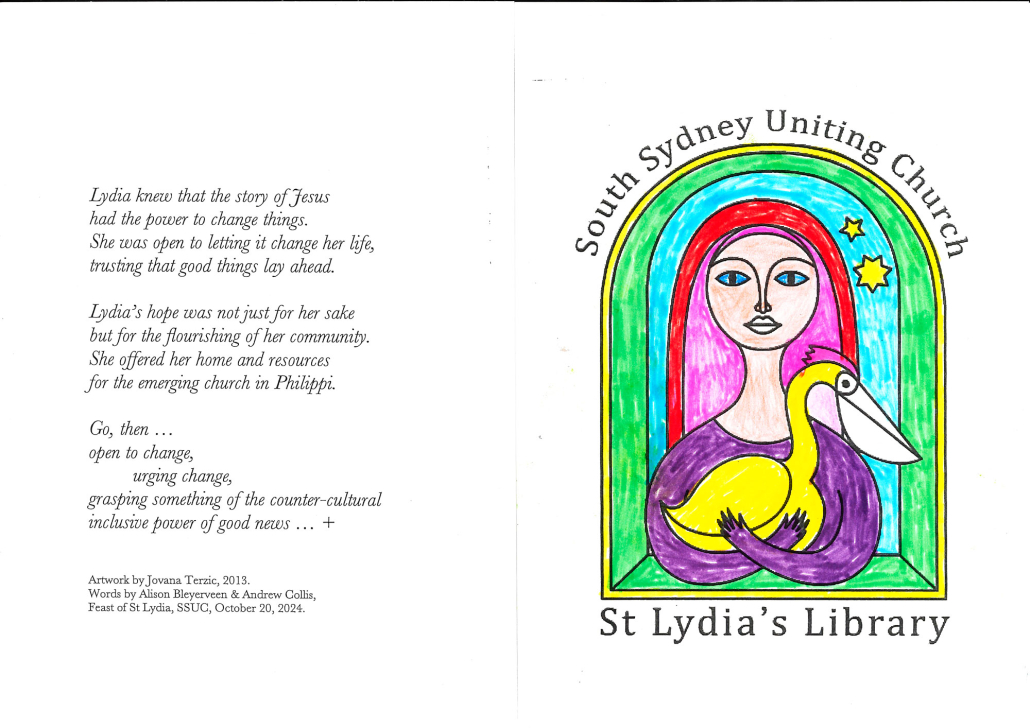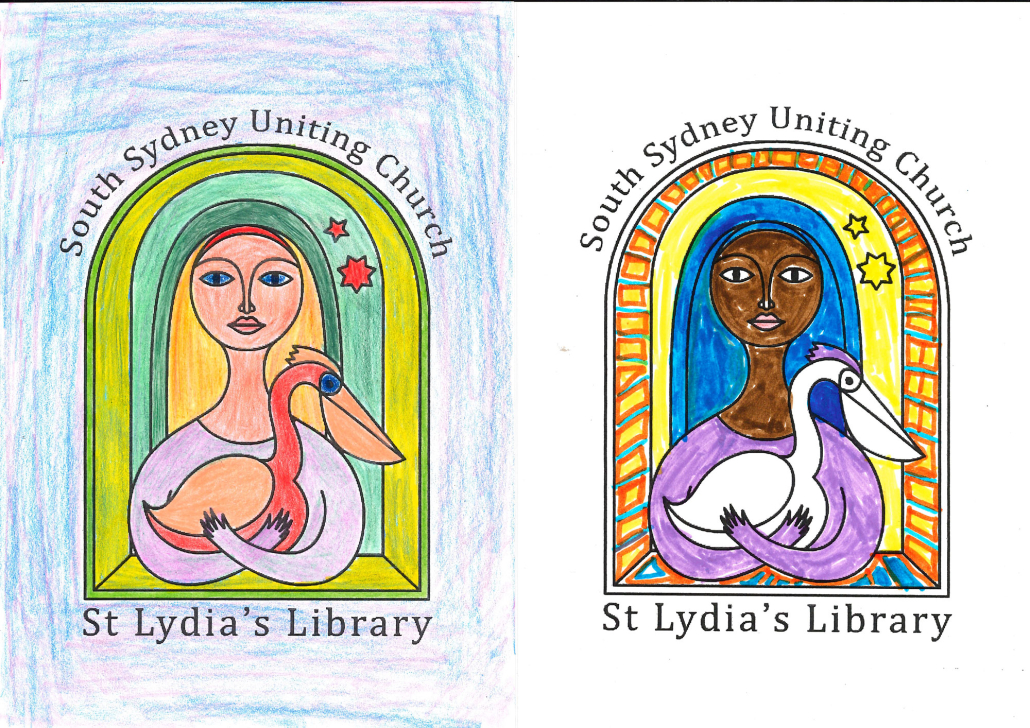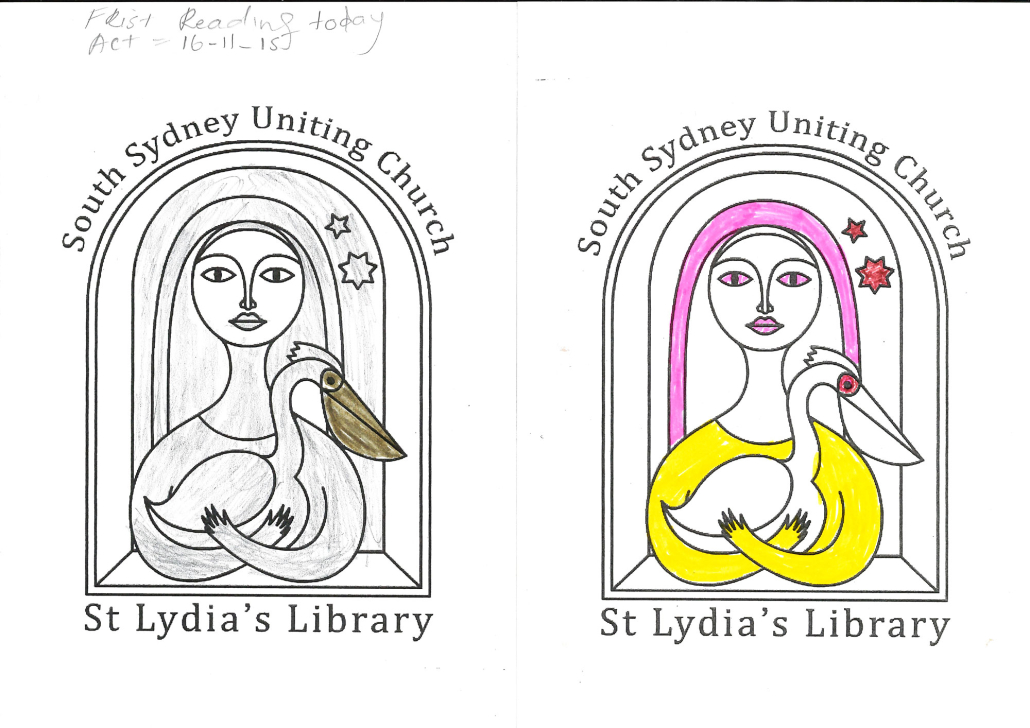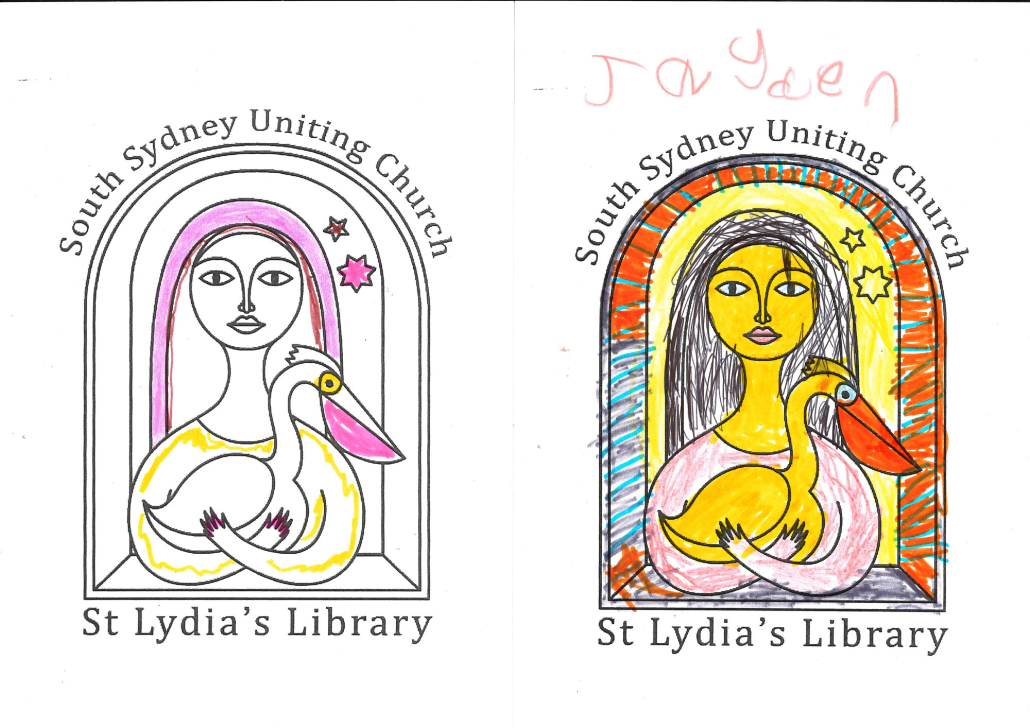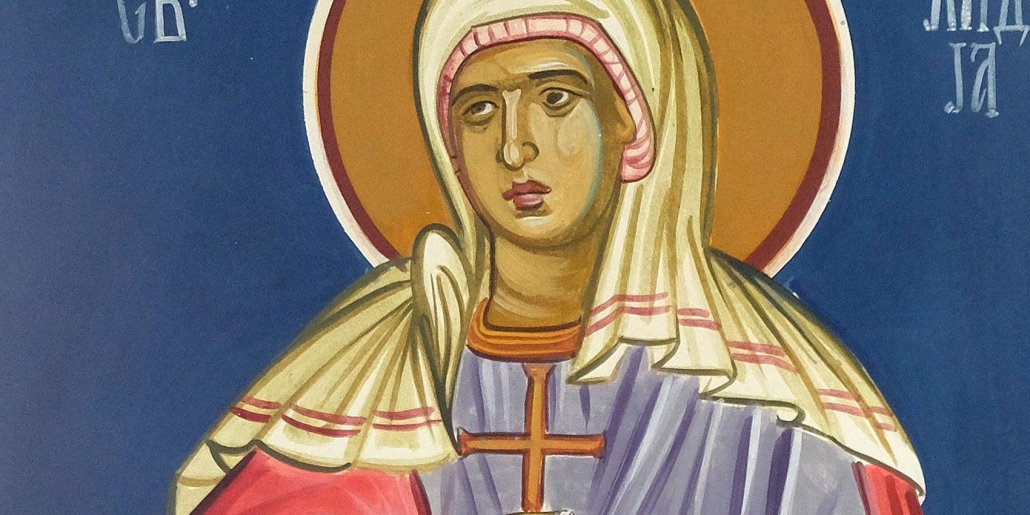Image: St Lydia of Thyatira (https://eyestoseetherevelation.com).
‘Feast Day of St Lydia’
Alison Bleyerveen
Ordinary Sunday 29, Year B
Acts 16:11-15; Psalm 100; Luke 15:8-10
Today our readings mark a celebration of the life, faith and legacy of St Lydia. Although there is only minimal reference to her in the bible, seven verses in Acts all up, she is a woman who has inspired a tradition connected to her open-hearted, responsive, courageous and generous faith, who crosses cultural boundaries and forges new relationships.
So why choose this Sunday to venture off the usual cycle of readings in our calendar? The celebration of Lydia’s feast day varies widely between different Christian traditions. In the Byzantine tradition she is remembered on May 20, while the Slavic churches commemorate her on both March 23 and June 25. Roman Catholics remember her on August 3, Anglicans on January 27, and the Lutherans, with whom we share reformed DNA, commemorate her on October 25. So, she is well remembered, and we are in the ballpark, today on October 20!
Lydia is also remembered at South Sydney via St Lydia’s Library which is named for her, and she inspired an artist in residence with the Orchard Gallery to depict her with a pelican! So who is this woman? Why is she so remembered? And why might she be a source of wisdom and encouragement for us here in this season of our life together?
I’d like us to look closely at the Acts text, which I think is as interesting for its gaps, silences and resonances, as it is for what is more explicitly said. You can see it there on the screen for reference, and I’ve added the previous verses for context. There are two main characters, Paul and Lydia, and I think they are both interesting in terms of their responsiveness to the call of God to go into new places and relationships with expectation and faith, and for the way that these encounters will change them.
The context for Paul’s journey to Phillipi was that he had a dream in which a man from Macedonia pleaded with him … come to Madedonia and help us! Paul immediately gathers together a team (it’s interesting here that the narration changes from references to what “they” did … and becomes all about what “we” did … possibly suggesting that this team includes the author of Acts. Anyway, the team set off across the Aegean Sea for the continent of Europe, and what is now Northern Greece. They pass through the port of Neapolis and head straight to Phillipi, Macedonia, a Roman colony. There’s an urgency and an expectancy in the language here that tells us something of Paul’s character and responsiveness to his sense of God’s mission, and conclusion that God was asking them to preach the gospel to them.
When they get to Phillipi, they stay within the city for a few days, and then, on the Sabbath, they go outside of the city gates, down beside the river, to a place that they supposed to be a house of prayer. Once again, we find a sense of expectation present in the text. Why did they suppose or expect this?
Paul’s pattern has been to seek out the synagogue in the towns he visited, going first to the Jews and only then to the Gentiles. In the Jewish diaspora, that means Jewish communities outside of Israel, synagogues were quite often outside the city and near a river, as water was symbolic and also important in purity rituals and in baptisms. Perhaps in the first days in the city he asked around? Or perhaps it was intuitive? But what is surprising is that they don’t find what they expected to find.
They don’t find a Macedonian man, or a group of Jewish men gathering as a synagogue, but rather a group of God-fearing women. The words in the text, “house of prayer”, are different in the Greek to the word for synagogue. Scholars aren’t sure why Luke uses it here. It may just be a synonym for synagogue, or, more likely, its usage points to the place being outside of Israel. But it is even more likely that it signals something a little different about the gathering in this place by the river. Scholars suggest that this may have included some Jewish women, perhaps manumitted (freed as slaves) to Roman men stationed in the city, but also women who were Gentiles attracted to and affiliated with worship of the one God. The text names them as God-fearers, gathering at a house of prayer, rather than Jewish believers gathering in a synagogue.
Although the expectations about how many Jewish men you needed to form a minyan or prayer circle, and a formal synagogue were still being firmed up in the rabbis’ minds at this time, it may also be that there weren’t many Jewish, circumcised men in Phillipi, if any. Contrary to what later church tradition asserted about the centrality of the leadership of men in Jewish prayer and worship, it was apparently quite common for women to take leadership roles, and ancient inscriptions bear witness to this. This was a group of God-fearing women, led by women, who were worshipping the one God according to Jewish law and tradition. They are gathering on the Sabbath, in a dedicated place, to worship. The narration gives no hint that the men were surprised by this gathering, although, as we’ve heard, it is not at all what they set out on their journey expecting. It simply says: “we sat down and began to talk to the women who had gathered.” They engaged with who they found.
It’s at this point that we meet Lydia. We learn her name, that she is a dealer in purple cloth, that she is from Thyatira (that’s modern day Turkey) and that she is a God-worshipper. That’s all the text offers. But we can read between the lines.
One possibility is that she is a freed slave. Thyatira is a city in the region of Lydia. Freed slaves were often named after the place they came from … thus she is named Lydia. Some scholars have even conjectured she may also be known as either Euodia or Syntoche, named by Paul in his letter to the Philippians, as co-workers.
Although this isn’t much, the fact that she is named at all suggests that she is a significant and influential woman. Lydia is also named as a “purple seller”, someone dealing in purple cloth, a very expensive fabric made with dye from sea snails, and which means she was a wealthy businesswoman engaged in public business. We also know she is independently wealthy because she has her own home and household and does not need to consult a male relative in her offer of hospitality to Paul and his companions. Women in this time were identified by their relationships to men, so we can assume that she had or no longer has a husband, nor a father, nor any male children or siblings. Whatever the trajectory, she has become a significant, independent woman with her own identity and volition.
What we don’t know is how she came to be a God worshipper. God-worshipper or God-fearer is an idiom that suggests Lydia was a Gentile adherent to Judaism, rather than a full convert. The collective term God-fearers makes it seem as though most of the women gathered were in this category, practising the teachings of the Jewish Law, and that Lydia may have been acting as a leader and patron of their regular gathering.
The text speaks of her open-hearted listening, and I love the picture that emerges here of Lydia as someone who has always been open-hearted, a seeker after truth, who has found in her heart the call of the one God, who has travelled from her home in one city to another, to affiliate herself with and support others, also so called. She is like the woman we heard of earlier today, who seeks for the lost coin, knowing it is precious, and who does not stop searching until she finds it. It speaks to me of the going before grace of God’s Spirit, who inhabits all of creation and speaks of love. It speaks to me of Lady Wisdom, who cries out outside the city gates, and at the crossroads, and in the high places, and by the river. And in Lydia, as she listens to Paul talk about Christ and his life, death and resurrection as God’s love and embrace for the world, and which changes everything, this comes to fruition and it all falls into place as her heart is opened once again by God and she welcomes the gospel. Then she and all her household are baptised. Again, this speaks to her influence as her faith, in a similar way to that of Cornelius, earlier in Acts, means that her household are incorporated into this way of life, and mark that with baptism.
But that’s not the end of it. This is perhaps my favourite part of this text. Lydia says to Paul, essentially, if what you have said is true and I am now judged as faithful to the Lord, then come and stay with me at my home. I see this as a challenge. Lydia challenges herself in this act of hospitality, because as we know from earlier parts of Acts, and Paul’s letters, to be a follower of Christ in a Roman world, and in the diaspora outside of Israel, was risky business. This offer of hospitality from someone prominent in Phillipi, would give Paul and his team sanctuary at a cost to Lydia’s own safety and reputation.
And it’s a challenge that Paul seems a bit reluctant about. It was definitely not culturally appropriate for men to stay in the home of a woman without a male protector, and I wonder whether Paul’s male Jewish sensibilities may also have been challenged by her previous Gentile status too. I wonder whether Lydia is giving a kind of challenge that connects to Paul’s assertions, in Galatia, for example that in Christ there is neither Jew nor Greek, male nor female, slave nor free. We can’t know. But it’s clear, even though there are gaps and silences, that robust back-and-forth conversation about her offer of hospitality took place because the words in the text say that she urged him, and eventually persuaded or prevailed upon him. If there was no question, then there would be no prevailing. I don’t actually like the Inclusive Language version of this text because it waters this down, saying simply that Paul agreed with her. Persuaded or prevailed is more faithful to the Greek, and far more interesting.
This is an early example of the way that the Gospel turns culture on its head. This is an early example of a crossing cultures text. Lydia herself crossing cultures, physically, and spiritually to make her home with the God-worshippers of Phillipi, and then again in her conversion to Christianity, and then again in her persistent and insistent offer of hospitality, and then again in the way she so clearly becomes a leader of the church in Phillipi.
Paul also crosses cultures, responding to a dream, travelling across the sea to another continent, finding and responding to people he did not expect, and taking up the offer of relationship and hospitality with Lydia’s household. This acceptance of hospitality would have given opportunity for Paul to speak at length about the way of Christ and to prepare Lydia and others for their roles as leaders of the church in Phillipi.
We here at South Sydney know of Lydia and Paul, and have been nurtured in our faith by them. When artist and friend Jovana Terzic spent time with us in 2013, she created an image that represented her sense of the importance of this story, this woman and her legacy for us. She chose to depict Lydia with a pelican at her breast because the pelican is a symbol for Christ in Middle Eastern and European cultures. The pelican nourishes her young with fish/faith, in a kind of eucharistic image. This is my body, feed on me with faith. More recently we have learnt that Biame, a creator spirit for Gadigal and other south-eastern mob, takes the form of a mother pelican in some song-lines and stories. We are learning to embrace wisdom, to embrace Christ who comes to us in culture and across cultures, and who challenges and expands and enlivens our faith in the God who indwells and calls in all patterns and places.
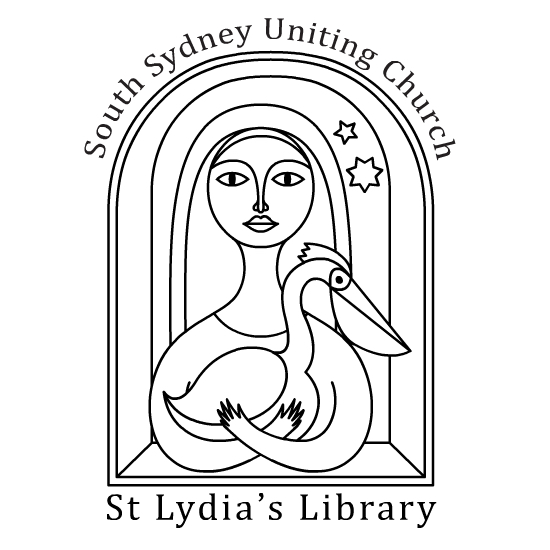
Image: St Lydia’s Library emblem by Jovana Terzic, 2013.
We here at South Sydney stand at a crossroads in our life together, and we might hear resonances of the challenges faced and embraced by Lydia and Paul. Will we go with them, embracing their legacy? Will we go out of our building, into the diaspora of Waterloo and Redfern, to find that God has gone before us, is waiting there for us? Will we go with expectancy, as those called in a dream, into the community centre across the road, into the cafes and parks, into the manse in George Street, and find in them a house of prayer and place for gathering, and Spirit-curious, God-fearing people who are waiting to hear the stories we have been entrusted with? And will we allow ourselves to be surprised by who and what we find? And will we allow the stories we hear there to change us, and our ideas about God and the people of God? And will we travel light, with only a few things in our backpacks, but an open, hospitable heart? And will we welcome the new people, and leaders that cross our path and enrich our understanding?
So much lies before us that is unknown and a bit scary. But we do not go alone. We go with the stories and legacy of saints, women like Lydia, with expectation, courage and faith. Amen.
